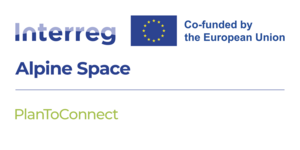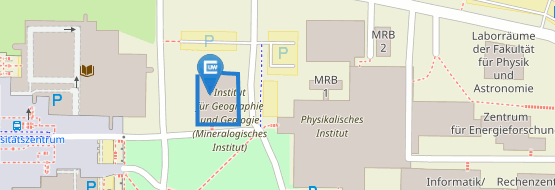Research

PlanToConnect – Mainstreaming ecological connectivity in spatial planning systems of the Alpine Space
- Funding body: Interreg Alpine Space Programme (European Regional Development Fund)
- Duration: 11/2022 – 10/2025
- Total project budget: 2.461.927,46 EUR
- Co-financing of the European Union: 1.846.445,59 EUR
- Subbudget JMU: 300.966,76 EUR (EU Co-financing: 225.725,07 EUR)
- Project website: https://www.alpine-space.eu/project/plantoconnect
- Leadership: Univ.-Prof. Dr. Hubert Job
- Contact person: Kerstin Ströbel, M. Sc., Constantin Meyer, M.Sc.
Promoting ecological connectivity is an important option to enable dynamic adaptation processes in ecosystems, and thus to combat the decline in biodiversity and preserve ecosystem functions, especially in view of the changing climatic conditions. While protected areas are well established, their connection through green and blue infrastructure/ecological corridors suffers from significant planning gaps, missing implementation and emerging threats, such as renewable energy production. An overarching connectivity planning concept guiding corridor implementation across alpine regions is currently missing. Therefore, regional networks, including design of corridors, need to be harmonized and planning systems upgraded to move from conventional land-use planning to more ecosystem function approaches. Know-how and experience developed by PlanToConnect and from previous Alpine Space projects (e.g. ALPBIONET2030, OpenSpaceAlps) will be applied to, and tested in, ecological network planning in the partner regions, a step towards the development of a coherent network of green and blue infrastructures throughout the Alpine Space. The PlanToConnect project comprises ten partner organisations from five Alpine countries.

Regional economic effects of sustainable tourism in nature parks and 'total economic valuation' of the National Natural Landscapes
- Funding body: UFOPLAN – BMU/Bundesamt für Naturschutz, Bonn
- Duration: 07/2020 – 12/2024
- Budget: 508.000 EUR
- Leadership: Univ.-Prof. Dr. Hubert Job
- Contact persons: Sarah Bittlingmaier, M.Sc., Anna Frieser, M.Sc., Dr. Lisa Majewski, Dr. Manuel Woltering
In recent years, almost all German national parks and biosphere reserves have now been analyzed with regard to their regional economic effects on the surrounding regions. The resulting data, such as the number of visitors per year or the proportion of guests coming because of the status as a protected area, are part of the Integrative Monitoring Program of the Federal Government and the Federal/State Working Group on Nature Conservation, Landscape Management and Recreation (LANA). For the category of nature parks, such an assessment of their importance for the tourism economy in Germany is still pending. Due to the large number of nature parks with more than 100 representatives, however, it is not possible to carry out a comprehensive case-by-case analysis. Instead, a nationwide statement is made on the basis of detailed knowledge of selected case studies by means of extrapolation. Furthermore, it is the aim of the project to carry out a 'total economic valuation' for the first time on the basis of the results on the economic importance of tourism as well as further analyses for all three categories of National Natural Landscapes.
Regional economic effects of tourism in the Berchtesgadener Land Biosphere Reserve
- Funding body: Regierung von Oberbayern
- Duration: 01/2021 – 10/2022
- Budget: 65.000 EUR
- Leadership: Univ.-Prof. Dr. Hubert Job
- Contact persons: Sarah Bittlingmaier, M.Sc., Dr. Manuel Woltering
Regional economic effects of tourism in the Hamburg and Lower Saxony Wadden Sea National Parks
- Funding body: Nationalparkverwaltungen Hamburgisches und Niedersächsisches Wattenmeer
- Duration: 12/2018 – 09/2022
- Budget: 135.000 EUR
- Leadership: Univ.-Prof. Dr. Hubert Job
- Contact persons: Sarah Bittlingmaier, M.Sc., Dr. Manuel Woltering
OpenSpaceAlps – Sustainable development of alpine open spaces by enhancing spatial planning governance
- Funding body: Interreg Alpine Space Programm (Europäischer Fonds für regionale Entwicklung)
- Duration: 10/2019 – 06/2022
- Budget: 128.000 EUR
- Leadership: Univ.-Prof. Dr. Hubert Job
- Contact person: Constantin Meyer, M.Sc.
Determining the socio-economic effects of tourism in German UNESCO biosphere reserves
- Funding body: UFOPLAN – BMUB/Bundesamt für Naturschutz, Bonn
- Duration: 04/2016 – 05/2022
- Budget: 545.000 EUR
- Leadership: Univ.-Prof. Dr. Hubert Job
- Contact persons: Dr. Manuel Engelbauer, Dr. Lisa Majewski, Dr. Manuel Woltering
Biodiversity and ecosystem services of forests with a focus on wood: new ways of sustainable use in the context of ecology, economy and climate change (BioHolz)
- Funding body: BMUB/BMBF, Berlin
- Duration: 07/2015 – 06/2021
- Budget: 438.000 EUR
- Leadership: Univ.-Prof. Dr. Hubert Job
- Contact person: PD Dr. Joachim Rathmann
Potential analysis of nature tourism in the Black Forest Biosphere Region
- Funding body: Deutsche Bundesstiftung Umwelt (DBU); Osnabrück
- Duration: 07/2015 – 06/2021
- Budget: 125.000 EUR
- Leadership: Univ.-Prof. Dr. Hubert Job
- Contact person: Dr. Lisa Majewski
Park-people relationships of the Berchtesgaden National Park
- Funding body: Nationalparkverwaltung Berchtesgaden
- Duration: 01/2018 – 12/2018
- Budget: 48.500 EUR
- Leadership: Univ.-Prof. Dr. Hubert Job
- Contact persons: Sarah Bittlingmaier, M.Sc., Dr. Manuel Woltering
Park-people relationships of the Bavarian Forest National Park
- Funding body: Nationalparkverwaltung Bayerischer Wald
- Duration: 06/2017 – 09/2018
- Budget: 48.500 EUR
- Leadership: Univ.-Prof. Dr. Hubert Job
- Contact persons: Sarah Bittlingmaier, M.Sc., Dr. Manuel Woltering
Current and potential regional economic effects of nature tourism in the nature parks Kyffhäuser and Südharz
- Funding body: Thüringer Ministerium für Umwelt, Energie und Naturschutz
- Duration: 10/2016 – 03/2018
- Budget: 116.000 EUR
- Leadership: Univ.-Prof. Dr. Hubert Job
- Contact persons: Dr. Manuel Engelbauer, Dr. Manuel Woltering
Socio-economic evaluation of possible national park regions
- Funding body: Bayerisches Staatsministerium für Umwelt und Verbraucherschutz
- Duration: 04/2017 – 07/2017
- Budget: 40.000 EUR
- Leadership: Univ.-Prof. Dr. Hubert Job
- Contact persons: Dr. Manuel Engelbauer, Dr. Manuel Woltering
National parks, nature tourism and demographic change in Germany: Potential effects on visitor frequency, structures and spatiotemporal movement patterns
- Funding body: Deutsche Forschungsgemeinschaft (DFG), Bonn
- Duration: 07/2014 – 06/2016
- Budget: 147.000 EUR
- Leadership: Univ.-Prof. Dr. Hubert Job
- Contact person: Dr. Johannes Schamel


